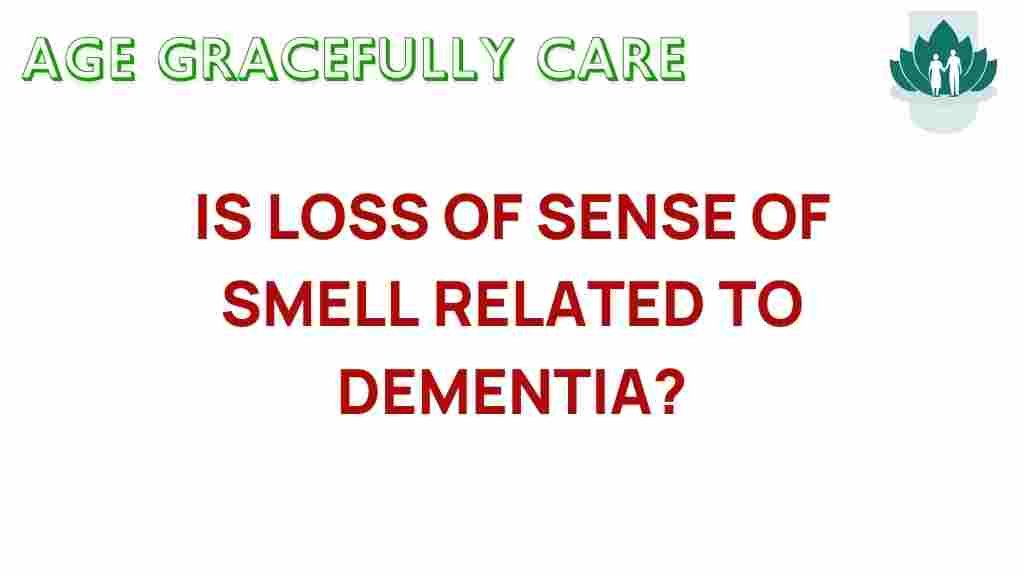Unraveling the Connection: Is Loss of Smell a Sign of Dementia?
The human body is an intricate network of senses that work together to provide a comprehensive experience of the world. Among these senses, smell plays a crucial role, not only in taste but also in emotional and cognitive functions. Recent research has shed light on the connection between loss of smell and various neurological conditions, particularly dementia. This article explores the potential link between loss of smell and dementia, including its implications for early detection and cognitive decline.
Understanding Smell and Its Importance
The sense of smell, or olfaction, is one of the first senses to develop and is closely tied to our memory and emotions. It is linked to the limbic system, which is responsible for emotional responses and memory formation. This connection highlights how sensory perception can influence our overall health and mental well-being.
As we age, our sensory perception, including smell, may decline. However, a significant loss of smell can be more than just a normal part of aging; it may signal underlying health issues, including dementia and other cognitive disorders.
The Link Between Loss of Smell and Dementia
Several studies have indicated that a decreased ability to smell can be an early warning sign of dementia and cognitive decline. Research suggests that individuals who experience significant loss of smell are at a higher risk of developing conditions such as Alzheimer’s disease. Understanding this connection can be vital for early detection and intervention.
- Alzheimer’s Disease: This is the most common form of dementia, where a gradual decline in cognitive function occurs. Studies show that individuals may experience olfactory dysfunction years before other symptoms manifest.
- Other Forms of Dementia: Beyond Alzheimer’s, conditions like Lewy body dementia and frontotemporal dementia also show a correlation with loss of smell.
Research Insights on Loss of Smell and Cognitive Decline
Research into the relationship between loss of smell and dementia has gained momentum in recent years. Here are some noteworthy findings:
- Olfactory Testing: Studies have utilized olfactory tests to identify individuals at risk for cognitive decline. These tests often involve identifying different scents or ranking their intensity.
- Neurological Changes: Research has shown that the pathways responsible for smell are often among the first to deteriorate in conditions like Alzheimer’s. This degeneration can precede more obvious cognitive symptoms.
- Age Factor: As individuals age, the ability to perceive smells diminishes. However, a significant or sudden loss of smell should be evaluated further, as it may indicate a more serious condition.
How Does Aging Affect Smell?
The aging process naturally affects various bodily functions, including our sense of smell. Here’s how aging correlates with loss of smell:
- Reduced Olfactory Receptors: With age, the number of olfactory receptors declines, leading to a diminished sense of smell.
- Changes in the Brain: Aging affects the brain regions associated with smell and memory, which can contribute to cognitive decline.
- Health Conditions: Older adults often suffer from chronic health issues that can impair the sense of smell, including sinus infections and neurological disorders.
Identifying the Signs of Loss of Smell
Recognizing loss of smell can be challenging, particularly if it occurs gradually. Here are some signs to watch for:
- Inability to Detect Odors: Noticing that you can no longer smell familiar scents, such as coffee or flowers.
- Altered Sense of Smell: Experiencing distorted smells, where things may smell foul or different than they used to.
- Decreased Interest in Food: A diminished sense of smell can lead to a reduced appetite, as food’s flavor is often tied to its aroma.
Step-by-Step Process: What to Do If You Experience Loss of Smell
If you or a loved one experiences a significant loss of smell, it’s essential to take proactive steps:
- Document Changes: Keep a journal of your experiences with smell, noting any changes or patterns.
- Consult a Healthcare Professional: Schedule an appointment with a doctor or a specialist in sensory disorders to discuss your symptoms.
- Undergo Testing: You may be referred for olfactory testing or other neurological evaluations to determine the underlying cause.
- Monitor Cognitive Health: Be aware of any additional cognitive changes, such as memory loss or confusion, and report these to your healthcare provider.
- Follow Treatment Plans: If a diagnosis is made, adhere to the recommended treatment or management plan.
Troubleshooting Tips for Maintaining Sensory Perception
While loss of smell can be concerning, there are ways to improve or maintain your sensory perception:
- Practice Smell Training: Engaging in smell training exercises can help retrain your olfactory system. This involves regularly smelling a variety of scents.
- Maintain a Healthy Lifestyle: A balanced diet, regular exercise, and staying hydrated can support overall health, including sensory perception.
- Avoid Smoking: Smoking can impair your sense of smell, so quitting can improve olfactory function.
- Manage Chronic Conditions: Work with your healthcare provider to manage any underlying health issues that may affect your sense of smell.
Conclusion: The Importance of Awareness and Early Detection
Understanding the connection between loss of smell and dementia is crucial for early detection and intervention. As research continues to explore this relationship, it becomes increasingly clear that loss of smell may serve as a valuable indicator of cognitive decline.
Awareness of the signs and symptoms associated with loss of smell can empower individuals to seek help sooner, potentially leading to better health outcomes. If you or someone you know is experiencing a significant decrease in the sense of smell, it’s essential to consult a healthcare provider. Early detection of conditions like Alzheimer’s disease can make a significant difference in managing symptoms and improving quality of life.
For more information on dementia and cognitive health, you can visit the Alzheimer’s Association website. For tips on maintaining sensory perception, check out this helpful resource.
This article is in the category Health and created by AgeGracefullyCare Team
